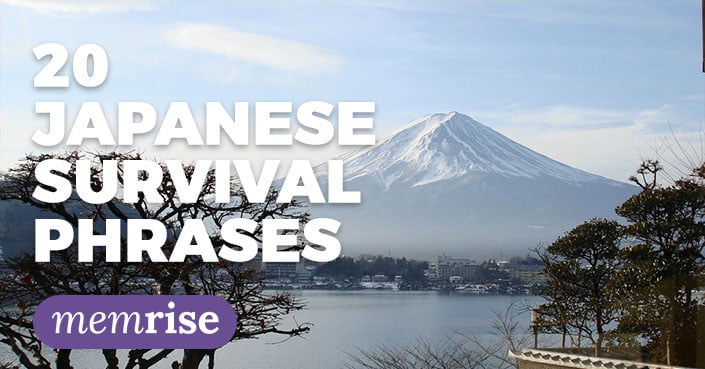In 2016, over 24 millions tourists from all over the world flocked to Japan for their holidays. Japan’s economy, being one of the largest in the world, also brings millions of businessmen to the country every year. Whatever reason you have for going to Japan, some knowledge of Japanese can undoubtedly be a real lifesaver!
With the help of Memrise’s exclusive Native Speaker Videos, we’ve put together 20 phrases to help you survive and even thrive on your next visit to Japan.
Want to learn more? Check out Memrise’s official Japanese courses!
1. こんにちは Konnichiwa / Hello
Let’s start with the basics! The “nichi” in “konnichiwa” means “day” so you can use it throughout the day. For the early morning, you can say “ohayō gozaimasu”, and in the evening, you can say “konbanwa”.
2. ようこそ Yōkoso / Welcome
The Japanese are a very welcoming people so you will no doubt here this said to you while you’re there.
3. ありがとう Arigatō / Thank you
Don’t forget manners are very important in Japan. “Arigatō” is how you say “thank you”, and if you want to be extra polite to the person you are saying it to, just add “gozaimasu”, and say “arigatō gozaimasu”.
4. おめでとうございます Omedetō gozaimasu / Congratulations
Just like with “arigatō gozaimasu”, this phrase can also be shortened to just “omedetō”. If you are unsure whether to use the short form without “gozaimasu”, or the longer, more polite form, go for the polite one.
5. 初めまして Hajimemashite / Nice to meet you
Making friends can be one of the most rewarding parts of traveling and discovering a new place. When you do, don’t forget to use this phrase.
6. 日本語で〜は何と言いますか?Nihongo-de … wa nan-to iimasu-ka? / How do you say … in Japanese?
There is no better place to learn the language than in the country with the natives. Take the opportunity to learn as much as you can using this nifty little phrase.
7. 私はわかりません Watashi-wa wakarimasen / I don’t understand
“Watashi-wa” means “I”, and “wakarimasen” means “don’t understand”. If you want to say that you do understand, just change the “-masen” to “-masu”, and say “watashi-wa wakarimasu”.
8. もっとゆっくり話してください Motto yukkuri hanashite kudasai / Speak slower, please
For those moments when you’re Japanese is so good that they start speaking to you at lightning speed. Literally “more – slowly – speak – please”.
9. 私は日本語を少し話せます Watashi-wa nihongo-o shukoshi hanasemasu / I speak a little Japanese
Japanese often try to use as few words as possible when speaking, so words like “watashi-wa” can be left out when the context is clear. So, in this case, you could just say “Nihongo-o sukoshi hanasemasu”.
10. すごい!Sugoi! / Great!
This is a really useful little phrase. If you want to sound extra Japanese try extending the “o” as much as you can. Sugoooooi, right?!
11. コーヒーはおいしいです Kōhī-wa oishī desu / Coffee is delicious
You can use this to talk about whatever you are eating or drinking by simply replacing “kōhī” with “rāmen” for example. “Rāmen-wa oishī desu!”
12. これはベジタリアンですか?Kore-wa bejitarian desu-ka? / Is this vegetarian?
An essential phrase if you don’t eat meat.
13. それはいくらですか?Sore-wa ikura desu-ka? / How much is that?
Remember again that, when it is clear from the context, you just simply say “ikura desu-ka?”.
14. 私はお腹が空いているから、怒っています Watashi-wa onaka-ga suite-iru kara, okotte-imasu / I’m angry because I’m hungry
Notice that this works the opposite way around to the English translation. Literally, it means: “My stomach is empty, therefore I am angry”.
15. メニューをください Menyū-o kudasai / The menu, please
You can also use this to ask for other things, for example, “naifu to fōku o kudasai” (“A knife and fork, please”).
16. 乾杯!Kampai! / Cheers!
If you drink alcohol, then why not see what effects a bit of Dutch courage will have on your Japanese skills. Kampai!
17. 問題ありません Mondai arimasen / No problem
This is the phrase for “there’s no problem”. Remember that you shouldn’t use this phrase when somebody says “arigatō” – to say “no problem” or “you’re welcome” in that kind of situation, you should say “dōitashimashite”.
18. トイレはどこですか?Toire-wa doko desu-ka? / Where is the toilet?
If you don’t plan on simply doing a tour of Japan’s lavatories, then just replace the word “toire” with anywhere else that you want to go. For example, “Pokemon-sentaa-wa doko desu-ka?”.
19. 私たちは道に迷いました Watashi-tachi-wa michi-ni mayoimashita / We are lost
If you get lost on your way to the Pokémon Centre, just use this phrase to ask for help from the locals.
20. さようなら Sayōnara / Goodbye
And finally, I don’t think think this word needs much explanation. Sayōnara!










